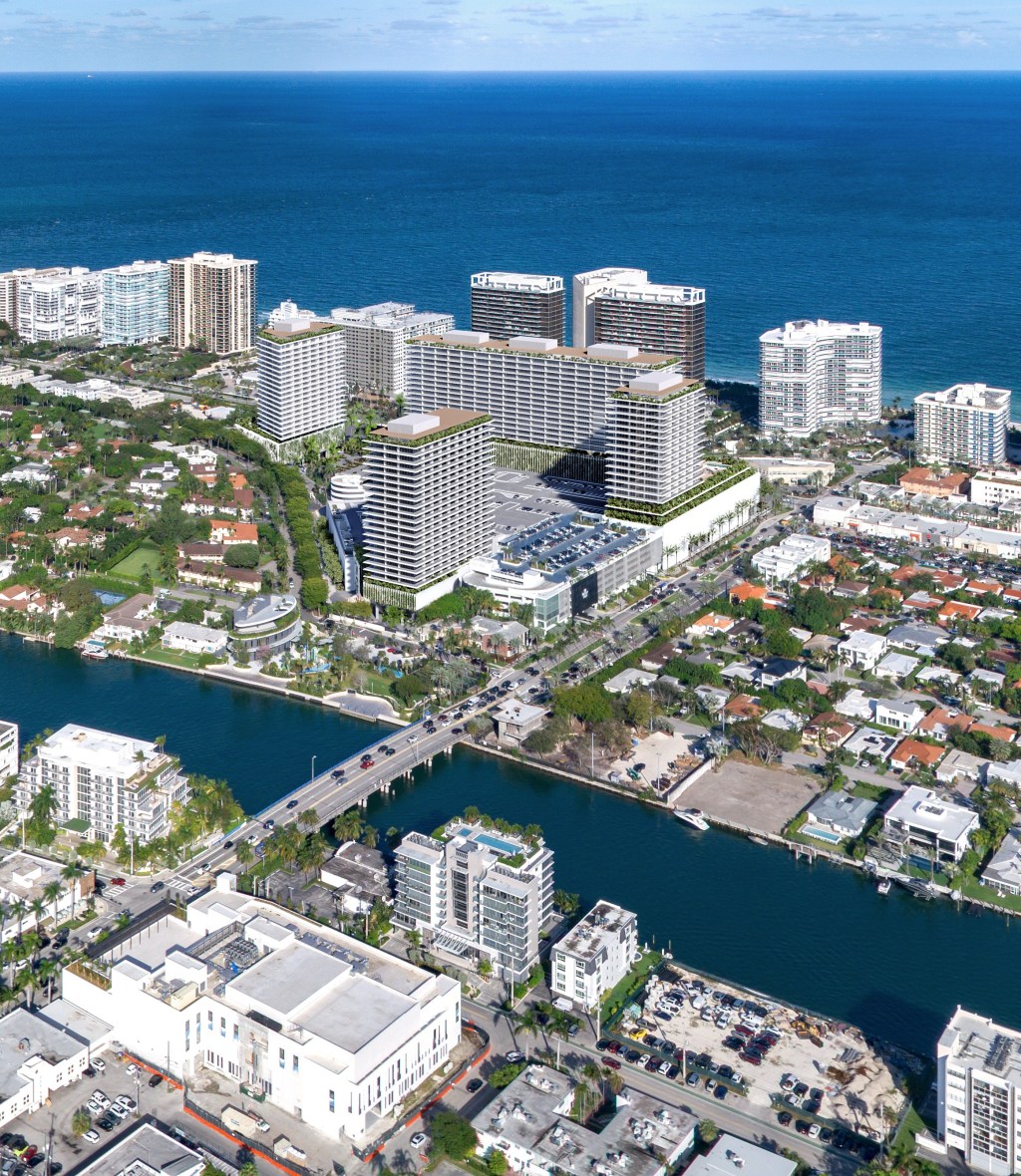Bal Harbour Shops has unveiled a grand transformation plan to develop market rate and affordable housing and a five-star hotel, adding to its large luxury retail expansion in progress and ultimately creating a “village center.”
Though construction is still years away, the plan suggests a bright future for Bal Harbour Shops, Miami’s highly productive open-air, luxury shopping and dining center, though Saks Fifth Avenue, a longtime tenant, may or may not be part of it.
In 2020, Bal Harbour Shops sought to evict Saks, claiming “extensive arrearages,” including overdue rent. A lawsuit against Saks was filed, seeking to terminate the lease and evict the store. Saks countersued, claiming Matthew Whitman Lazenby, president and chief executive officer of Whitman Family Development, the owners of Bal Harbour Shops, breached the parties’ contract and Bal Harbour’s fiduciary duty and that in an effort to increase pressure on the retailer to resolve the dispute related to lease payments during the COVID-19 pandemic, Lazenby disclosed confidential information to the media. The litigation is ongoing.
Bal Harbour Shops intends to build a 70-room hotel where Saks currently sits in the shopping center. Saks opened its three-level, 180,000-square-foot store at Bal Harbour Shops in 1976, becoming the center’s second anchor tenant, following Neiman Marcus, which opened there five years before.
Lazenby, while mentioning the plan to replace Saks with a hotel, declined to comment on the litigation or the terms of the Saks lease.
Getting a hotel built could depend on the outcome of the court case, or an expiration of the lease, though that seems far off. A Saks stores spokesperson said the retailer signed its lease in 1974, which was extended to 2077, and added that Saks, at Bal Harbour Shops, “has always been a good partner and tenant, a significant part of the success of Bal Harbour Shops, and expects to continue to be part of that success for many years to come.”
“Throughout our long-term lease, we have made significant capital investments to ensure we provide the best possible luxury shopping experience for Bal Harbour customers,” the spokesperson said. “Bal Harbour Shops’ ongoing attempt to evict Saks is wrongful and it is clear that they are not acting in good faith. Saks Fifth Avenue will continue to defend itself vigorously and has strong legal arguments in place to do so. We also intend to oppose Bal Harbour Shops’ unapproved and unwanted plans by all legal means at our disposal.”
Whitman Family Development last Tuesday submitted plans for the mixed-use development on its 18-acre property. It involves creating three towers comprising 528 apartments, 40 percent of which would be designated for families with incomes of $90,000 or less. One of the towers is planned on land once reserved for a Barneys New York opening, but Barneys went bankrupt and liquidated, nixing that plan.
The project, once completed, would energize Bal Harbour Shops and the community by bringing residents to the area, including those that could potentially get jobs in the center, those inclined to shop the center, and tourists staying in the hotel.
The development is made possible by Florida’s Live Act, a bipartisan bill passed by the Florida legislature last year to stimulate affordable housing development, which is seriously lacking in Miami and other U.S. cities. According to a statement from Whitman Family Development, the legislation enables developers to build greater density and reach building heights within the scale of the surrounding area, so long as they commit to including attainable housing units. The law requires that local municipalities approve mixed-use residential projects in any area zoned commercial through an administrative review process, allowing developers to accelerate their timelines. In exchange, property owners must commit to designating at least 40 percent of all residential units as attainable or affordable housing for at least 30 years.
Transforming Bal Harbour Shops into a mixed-use destination is not a new idea that sprung out of the legislation.

“My grandfather had a vision that contemplated multiple uses. We’ve got renderings that show a tower for a hotel or office or some combination of, and we were working with Ritz Carlton in the ’80s,” Lazenby told WWD, referencing his grandfather, the late visionary developer of Bal Harbour Shops, Stanley Whitman. “But for the past 20 years, we’ve focused on the retail expansion. But this plan submitted finally makes that hotel vision and bringing residential in possible, to really create a pure village center, and activate the site 24 hours a day. In the past, we’ve lamented that at 9 p.m. everyone goes home and this place goes dark.” Having people residing at the site would change the vibe.
Additionally, as Lazenby said, “It’s our intention to start with affordable workforce housing that addresses a critical need — the Miami area has the greatest housing cost burden of any SMA in the country.”
Under Florida’s new law for the new development to happen, at least 65 percent footage of the Bal Harbour site must be residential. Of the 528 residential units planned, 300 would be at market rates, and 228 affordable.
The center’s retail expansion will add about 250,000 square feet of additional space, bringing the shopping center to about 700,000 square feet. Lazenby said the retail growth will enlarge Bal Harbour Shops’ workforce to about 2,000 employees from the current 1,200. Per the new law, with retail expansion, there must be at least 2.1 million square feet of residential.
“When you take well-executed retail and add to that a well-executed luxury residential and affordable housing components for fire workers, police, teachers, retirees, young professionals, we hope the whole will be greater than the sum of its parts,” Lazenby said.
Getting approvals for the residential/hotel development, Lazenby said, won’t be an ordeal, since Florida has created a streamlined process for it to help alleviate the state’s affordable housing crisis. Lazenby said construction on the development is still at least two years away, with approvals, finalized design plans and financing needed. Also, operators for the residential and hotel components would have to be designated.
Asked if finding labor has been an issue for Bal Harbour Shops, Lazenby said, “I’m not aware of a shortage of quality retail workers. Restaurants do express a concern.”
That’s largely because most restaurant workers cannot afford to live near or within a reasonable distance of Bal Harbour Shops, where housing rents are as high as $7,000 to $8,000 a month. Lazenby also said that the Miami Country Dade School, where he serves as president of the board, struggles to get teachers because they can’t afford to live close enough. In addition to owning Bal Harbour Shops, located at 9700 Collins Avenue, Whitman Family Development has a minority equity interest in the retail component of Brickell City Centre.
Lazenby said a 70-room, five-star hotel “in line with all of the retail brands,” is envisioned. The market rate apartments would have residents that fit a luxury customer profile. Also, the development would bring 45,700 square feet of additional retail space.
The plans were filed with the Village of Bal Harbour. Once building permits are issued, the multiphase project will begin developing that attainable housing tower on the property’s southwest corner, followed by luxury residential units, and the boutique hotel, depending on the Saks court case, or if an alternative site could be determined. The plans indicate the new towers will rise to about 275 feet, consistent with adjacent buildings in the village, including the St. Regis Bal Harbour Resort across the street.
Separately, Bal Harbour Shops’ $550 million, 200,000-square-foot retail expansion is slowly progressing, delayed by COVID-19, material costs and other factors. Space in the expansion will be occupied by a combination of certain luxury brands entering Bal Harbour Shops, such as Dior, Cartier, Gabriela Hearst and Eden Gallery Art, and others such as Graff, Saint Laurent, Alexander McQueen, Bottega Veneta and Burberry relocating existing stores to the expansion, typically with larger spaces.
“We are pushing hard to make a 2025 opening, but certainly it will happen by 2026,” Lazenby said.



